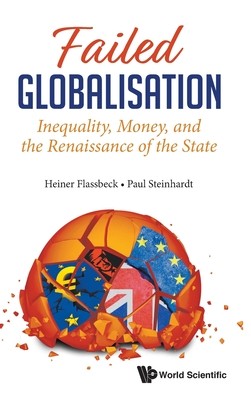
- We will send in 10–14 business days.
- Author: Heiner Flassbeck
- Publisher: World Scientific Publishing Company
- Year: 2020
- Pages: 340
- ISBN-10: 9811215758
- ISBN-13: 9789811215759
- Format: 15.2 x 22.9 x 1.9 cm, kieti viršeliai
- Language: English
- SAVE -10% with code: EXTRA
Failed Globalisation: Inequality, Money, and the Renaissance of the State (e-book) (used book) | bookbook.eu
Reviews
Description
Globalisation is considered a success story. Following the fall of the Berlin Wall and the dissolution of the political divides between East and West Germany, nothing seemed to stand in the way of peaceful cooperation between people everywhere. Under the precepts of economic liberalism, by removing institutional obstacles to international trade and capital flows, a spontaneous global order would emerge, and the dream of a world populated by free and prosperous global citizens would eventually come true.But in the wake of the worldwide financial crisis that began in 2007-2008, in the world of an ongoing Euro-Crisis, Trump and Brexit, it has become apparent that the great liberal project has failed. Neoclassical liberal economic theory has shown itself to be fundamentally incapable of explaining the dynamics of a market economy and in guiding economic policy in developed as well as in developing countries.Given the continuing dominance of that discredited theory today, the world lacks a viable conceptual framework for global cooperation among nations, and appropriate national economic policies. With this book, the authors show how such a framework can be built on the basis of a modern and empirically sound economic theory.
EXTRA 10 % discount with code: EXTRA
The promotion ends in 22d.17:19:15
The discount code is valid when purchasing from 10 €. Discounts do not stack.
- Author: Heiner Flassbeck
- Publisher: World Scientific Publishing Company
- Year: 2020
- Pages: 340
- ISBN-10: 9811215758
- ISBN-13: 9789811215759
- Format: 15.2 x 22.9 x 1.9 cm, kieti viršeliai
- Language: English English
Globalisation is considered a success story. Following the fall of the Berlin Wall and the dissolution of the political divides between East and West Germany, nothing seemed to stand in the way of peaceful cooperation between people everywhere. Under the precepts of economic liberalism, by removing institutional obstacles to international trade and capital flows, a spontaneous global order would emerge, and the dream of a world populated by free and prosperous global citizens would eventually come true.But in the wake of the worldwide financial crisis that began in 2007-2008, in the world of an ongoing Euro-Crisis, Trump and Brexit, it has become apparent that the great liberal project has failed. Neoclassical liberal economic theory has shown itself to be fundamentally incapable of explaining the dynamics of a market economy and in guiding economic policy in developed as well as in developing countries.Given the continuing dominance of that discredited theory today, the world lacks a viable conceptual framework for global cooperation among nations, and appropriate national economic policies. With this book, the authors show how such a framework can be built on the basis of a modern and empirically sound economic theory.


Reviews